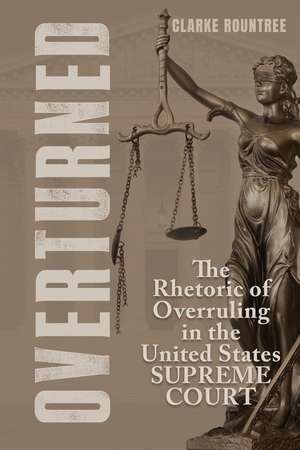Overturned: The Rhetoric of Overruling in the United States Supreme Court: Rhetoric, Law, and the Humanities
Autor Clarke Rountreeen Limba Engleză Paperback – 17 dec 2024
An audacious US Supreme Court is overturning a number of long-standing precedents, and Overturned offers a lively account of the court’s history of overturning prior cases and examples and analyses of 300 cases overruled in its history.
The immense controversy surrounding the case of Dobbs v. Jackson Women’s Health Organization in 2022, which overruled Roe v. Wade and erased the constitutional right to abortion in the United States, has focused public attention on how and why the Supreme Court knocks down long-established precedents.
In his vivid and accessible style, scholar Clarke Rountree recounts the rhetorical pirouettes and linguistic acrobatics the court has deployed to explain its reversal of Dobbs and numerous other landmark decisions. He reviews strategies the court uses to undermine a previous court’s standing without undermining its own. He analyzes overrulings across time, by type (constitutional cases versus statutory and common law cases), by the ages of the overturned precedents, with changes in the court’s membership, and through other variables.
Rountree gives engrossing accounts of pivotal overrulings in the past, such as when Lincoln’s Treasury Secretary Salmon Chase used the Legal Tender Act in 1862 to raise money for the Civil War then ruled the same law unconstitutional in 1870 when he served as chief justice. Rountree retells Thomas Edison’s attempt to monopolize the burgeoning film industry, which was stopped only when the Supreme Court overturned an earlier patent-rights case in 1917. Finally, Rountree applies his myriad insights to the politically fraught Dobbs case.
Overturned makes a valuable contribution to law, rhetoric, politics, and history, and readers interested in the role and function of America’s highest court will find Rountree’s account fast-paced, lively, and engaging.
Preț: 288.98 lei
Nou
Puncte Express: 433
Preț estimativ în valută:
55.29€ • 57.73$ • 45.76£
55.29€ • 57.73$ • 45.76£
Carte disponibilă
Livrare economică 14-28 martie
Preluare comenzi: 021 569.72.76
Specificații
ISBN-13: 9780817361808
ISBN-10: 0817361804
Pagini: 366
Dimensiuni: 152 x 229 x 28 mm
Greutate: 0.56 kg
Editura: University Of Alabama Press
Colecția University Alabama Press
Seria Rhetoric, Law, and the Humanities
ISBN-10: 0817361804
Pagini: 366
Dimensiuni: 152 x 229 x 28 mm
Greutate: 0.56 kg
Editura: University Of Alabama Press
Colecția University Alabama Press
Seria Rhetoric, Law, and the Humanities
Notă biografică
Clarke Rountree is professor emeritus in the Department of Communication Arts at the University of Alabama in Huntsville. He is editor of Venomous Speech: Problems with American Political Discourse on the Right and Left and editor of the University of Alabama Press’s Rhetoric, Law, and Humanities series.
Cuprins
Acknowledgments
Chapter 1 Judicial Rhetoric and Overruling in the US Supreme Court
Chapter 2 Stare Decisis and Overruling in the US Supreme Court
Chapter 3 Overruling in the Nineteenth Century: Maritime and Money
Chapter 4 Overruling Statutory Interpretations: Jurisdiction, Patents, and Civil Rights
Chapter 5 Justifying the "Switch in Time That Saved Nine": The Supreme Court's About-Face Following FDR's Court-Packing Threat
Chapter 6 Expanding Civil Rights and Challenging States' Authority: Fourteenth Amendment Overruling Cases
Chapter 7 Dobbs v. Jackson and the Decline of Stare Decisis in the Roberts Court
Appendix A: US Supreme Court Overruling and Overruled Cases
Appendix B: Cases Excluded from Overruling List
Notes
Bibliography
Index
Chapter 1 Judicial Rhetoric and Overruling in the US Supreme Court
Chapter 2 Stare Decisis and Overruling in the US Supreme Court
Chapter 3 Overruling in the Nineteenth Century: Maritime and Money
Chapter 4 Overruling Statutory Interpretations: Jurisdiction, Patents, and Civil Rights
Chapter 5 Justifying the "Switch in Time That Saved Nine": The Supreme Court's About-Face Following FDR's Court-Packing Threat
Chapter 6 Expanding Civil Rights and Challenging States' Authority: Fourteenth Amendment Overruling Cases
Chapter 7 Dobbs v. Jackson and the Decline of Stare Decisis in the Roberts Court
Appendix A: US Supreme Court Overruling and Overruled Cases
Appendix B: Cases Excluded from Overruling List
Notes
Bibliography
Index
Recenzii
“This book does not disappoint. . . . This is an important and relevant work.” —Trevor Parry-Giles is author or coauthor of many titles, including The Character of Justice: Rhetoric, Law, and Politics in the Supreme Court Confirmation Process.
Descriere
A timely and lively summary and analysis of the Supreme Court’s justifications for overruling nearly 300 prior rulings in its history


